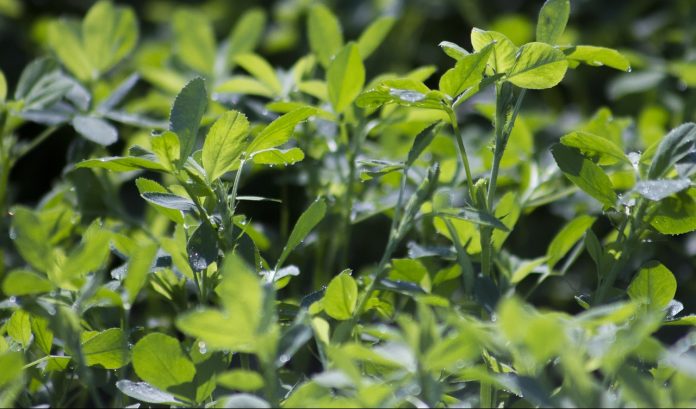ITHICA, N.Y. — Farmers in New Mexico, Texas, Ohio, and Michigan want to know more about a crop pest solution developed on farms in Northern New York and in the Shields Lab at Cornell University.
Initially developed to protect the alfalfa crops so critical to the Northern New York dairy industry, using biocontrol nematodes as a non-chemical management practice has shown promise for reducing not only damage by alfalfa snout beetle but by other field crop and fruit pests.
Research
With a mandate backed by a 30-year commitment from the farmer-driven Northern New York Agricultural Development Program, Cornell University entomologist Elson Shields, Ph.D., and Research Specialist Antonio Testa pioneered the science of using a combination of two NY-native nematodes.
They are trying to reduce the alfalfa snout beetle populations that were frequently destroying entire fields of alfalfa in one season.
Once they proved the biocontrol nematodes, in a single application, could significantly reduce the pest population by destroying alfalfa snout beetle larvae over multiple growing seasons, Shields and Testa tested and found success with the use of the biocontrol nematodes for managing pests in strawberry and blueberry crops.
Current funding from the Northern New York Agricultural Development Program is underwriting on-farm trials evaluating the impact of biocontrol nematodes on corn rootworm in corn grown in rotation on alfalfa acres.
National interest
In June 2017, New Mexico-based researchers established a biocontrol nematode test plot in an alfalfa field infested with white fringe beetle, an insect similar to alfalfa snout beetle and similarly not controlled by conventional pesticide treatment.
If soil samples analyzed this fall by the Shields Lab show establishment of the microscopic biocontrol nematodes in the trial plot in northeastern New Mexico, the research will be expanded to include the potential to control white fringe beetle and longer-term persistence studies.
In West Texas, near Dalhart, a biocontrol nematode trial was established in May 2017 in a cornfield with severe corn rootworm populations.
Rootworm populations in the area are suspected of becoming resistant to the various Bt-rootworm toxins incorporated into corn varieties.
Results
Shields said they did not expect any positive results from the West Texas trial until 2018, but the biocontrol nematodes reduced the rootworm feeding damage by two-thirds compared to conventional corn planted without soil insecticide.
The NY-native nematodes performed beyond expectations under the extremely heavy pressure.
Recently analyzed samples from the West Texas trial showed the biocontrol nematode population there has dramatically increased.
Shields and his colleagues in Ohio and Michigan are awaiting response to a USDA grant request to test the NY-native biocontrol nematodes against corn rootworm in those states and to continuing the promising field work in Texas.
Northern New York farmers on 100 farms have applied the biocontrol nematodes to more than 19,000 acres of alfalfa as of September 2017.
The Northern New York biocontrol nematode research has also attracted international attention.
In June 2015, a Russian delegation representing the largest milk producer in Russia and Europe traveled to Northern New York specifically to meet with Shields and tour regional farms seeing the results of applying the biocontrol nematodes.
In Europe, alfalfa snout beetle is also a pest of grapes and hops, newly emerging agricultural crops across New York State.
The New York Farm Viability Institute, which funds projects statewide, is currently funding biocontrol nematode trials against pests in corn, sod, apples, strawberries and greenhouse crops in the Finger Lakes, Hudson Valley and other regions of New York State.
The history, results and widespread impact of alfalfa snout beetle research are chronicled on the Northern New York Agricultural Development Program website, www.nnyagdev.org.










